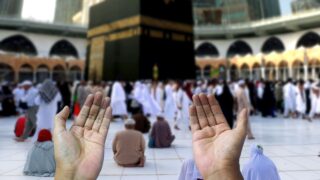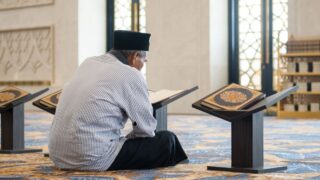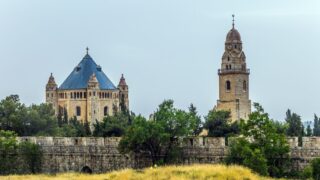Profiles From South Africa
Sheikh Ahmed Deedat
Demystifying Islam and Debating Christianity
In the context of IslamOnline.net’s special coverage of Muslims in South Africa, we present a series of profiles of prominent South African Muslim figures. Below is the profile of Sheikh Ahmed Deedat, a man who demystified Islam for the West and formed a formidable nemesis to the Christian missionary agenda.
When I consider how my light is spent
Ere half my days, in this dark world and wide,
And that one talent which is death to hide
Lodged with me useless, though my soul more bent
To serve therewith my Maker, and present
My true account, lest He returning chide, —
Doth God exact day-labour, light denied?
— John Milton, On His Blindness (1-7)
Unflinching, unnerving, and inimitable, Deedat’s approach still provides a lesson for many young Muslims in the post-September 11 climate.
On a chilly August day in Verulam, Durban, the Muslim world lost one of its most dynamic and arguably most controversial voices, Ahmed Hoosen Deedat. It had been years since he had uttered his last words, and almost a decade since his last charismatic and spellbinding appearance before an attentive audience in Sydney, Australia, who had scooped up and devoured every one of his sentences.
Leaving him unable to talk or even to smile, the stroke that Deedat suffered from in 1996 bore parallels to the blindness of the great writer John Milton or the Parkinson’s disease that struck the boxing champion Muhammad Ali. It is utter torment for ordinary human beings to bear seeing a great individual’s greatest assets become permanently muted in an instant. Deedat bore his burden with stoic resolve and utter submission to the One he had served so readily all his life.
Nine-year-old Deedat migrated with his family from Surat in India to what is now known as Kwazulu-Natal located on South Africa’s eastern coast. Seven years later, while still a teenager, the young Deedat was forced to leave school in order to help his family’s depleted finances. For some people, being plucked out of the education system at a young age often proves to be a catastrophe that pushes them into a multitude of societal vices. It was not so for this 16-year-old. As a furniture salesman, he had encounters with Christian missionaries who were determined to convert him from Islam and to their faith. Deedat was unwittingly preparing himself for an unofficial PhD in comparative religions.
South Africa had deep racial divides, and Calvinist Christian ideology was used by the authorities to numb and pacify the masses.
The proverbial spur to prick his intent had arrived. The young Deedat was desperate to educate himself about Islam in order to counter the missionary effort. Naturally blessed with the gifts of a razor-sharp wit, a dependable memory, an above-average height for an Indian, and a handsome, pleasant face, Deedat got to work. The marked difference between Deedat’s approach and that of his contemporaries, however, would prove to be decisive in catapulting this simple man of humble beginnings into the world spotlight. The Qur’an and the Hadith were not the only components of Deedat’s arsenal of knowledge; Deedat would also turn to, with studious endeavor, the Bible.
Within the context of his upbringing and his times, Deedat became a visionary. The South Africa of Deedat’s youth was a nation full of deep racial divides, and the disparity between white and non-whites was ever increasing. It was also a nation that found convenience in Calvinist Christian ideology, finding it a stable servant of the authorities through which they could numb and pacify the masses.
Deedat was a menace to Christian missionary work. He was not unwilling to distance himself from stirring up volatile debates.
Missionary activity was booming, and on the whole, the majority who took it upon themselves to spread the gospel were sincere, well-meaning Christians, convinced by the absolute truth of their faith. For some, however, the more blacks and colored (those of Southeast Asian descent) people and Indians (those of Indo-Pakistani descent) converted to Christianity, the more they were willing to accept their “rightful” places as the subordinate, younger brethren of their white colleagues in faith. Deedat’s response to any missionary who maligned Islam and aimed to show the absolute certainty of the Bible was hardly stuff for the faint-hearted.
He delivered his first lecture, entitled “Muhammad: Messenger of Peace,” in 1942. There were 15 people in attendance at a quiet Durban movie theater. In 1957, Deedat spearheaded the opening of the Islamic Propagation Centre International (IPCI) in Durban. The IPCI continues to run to this day with the overriding aim of da`wah.
Deedat was hurled into the conscience of the Arab public after a televised interview in 1986, and the people of the Arab and Muslim world have never forgotten him since. Deedat strove to expose the truth about Christianity. The bulk of the Bible consists of a collection of smaller books written by different authors whom Christians believe were inspired by God. Deedat strategically set out to expose the historical inconsistencies present in the Christian scriptures. Using Islam as a reference point, Deedat was a menace to Christian missionary work, and he was not unwilling to distance himself from stirring up volatile debates. His efforts earned him the King Faisal Award from Saudi Arabia in 1986 for his outstanding services to Islam.
One of Deedat’s more memorable debates was with the evangelical figurehead Jimmy Swaggert. In retrospection, a great irony of the debate is the fierceness in which Swaggert attacked Islam’s allowance of polygamy. Deedat did not waver, while Swaggert proudly asserted, “I am happy with my wife!” Swaggert was later exposed for having a series of meetings with prostitutes.
Although paralyzed by his illness since 1996, he continued to be an inspiration to the Muslim community, even from his sickbed.
Unflinching, unnerving, and inimitable, Deedat’s approach still provides a lesson for many young Muslims in the post-September 11 climate. However, there are certain elements of his work that will remain embedded in its own socio-political context and cannot be applied to contemporary discourse. For many of today’s Western intelligentsia, the mere exposure of inconsistencies in the Bible proves nothing about the truth of Islam, as the secular mind is antagonistic to religion.
Deedat traveled to Saudi Arabia, the United Kingdom, Morocco, Kenya, Sweden, Australia, Denmark, and Iran during his long service to Islam. He was profoundly moved by his visit to Iran in 1982. Upon returning to South Africa, he began to encourage unity between the Sunni and Shiite factions of Islam and spoke glowingly about his encounter with Ayatollah Khomeini:
There were about forty of us who waited for the Imam and the Imam came in and was about ten meters away from where I was, and I saw the Imam. He delivered the Lecture to us for about half an hour, and it was nothing but the Quran, the man is like a computerized Quran. And the electric effect he had on everybody, his charisma, was amazing. You just look at the man and tears come down your cheek. You just look at him and you get tears. I never saw a more handsome old man in my life, no picture, no video, no TV could do justice to this man, the handsomest old man I ever saw in my life was this man. … But they are waiting for the Mahdi, and not Khomeini. They want to clean the stables and make preparations for the Mahdi to come. In the Sunni world we are also waiting for the Mahdi to come but we want him to clean the stables for us, make us masters of the world and to make us sit on the thrones. (“Sunni-Shia Unity”)
Sheikh Ahmed Deedat, although paralyzed by his illness since 1996, continued to be an inspiration to the Muslim community, even from his sickbed. Although his facial muscles were paralyzed, he never refused visitors and had devised an innovative method of coordinating a form of communication with his eyes and letters of the alphabet on his bedroom wall.
When his time in this earthly realm had passed in 2005, tributes stormed in from every corner to remember a man who had demystified Islam for the West and had formed a formidable nemesis to the Christian missionary agenda. Over the years, thousands flocked to Islam as a result of Deedat’s preaching, and thousands more continue to marvel at the magnetic effect the sheikh has had, and continues to have, on human beings from all walks of life.
By Imran Garda
Sources:
Asmal, Fatima. ” Muslims Mourn Late Sheikh Deedat” IslamOnline. 8 Aug 2005.
Deedat, Ahmed. ” Sunni-Shia Unity.” Lecture delivered 3 Mar 1982. Innovative Minds.
Islamic Propagation Centre International.
Khan, Asim. ” The Life of Shaikh Ahmed Deedat” Al-Jazeera.net. 20 Aug 2005.
Wikipedia. ” Ahmed Deedat.” Wikipedia.
Imran Garda is a freelance journalist based in South Africa.

















